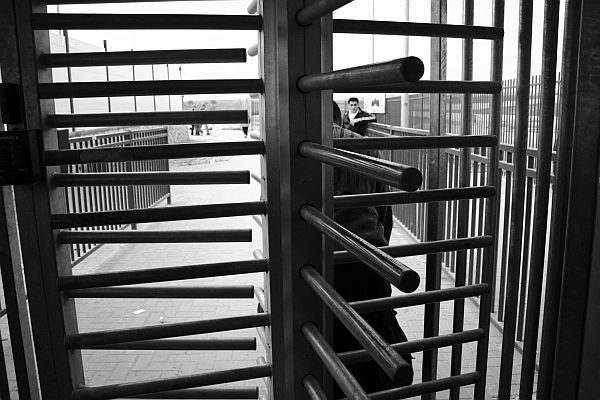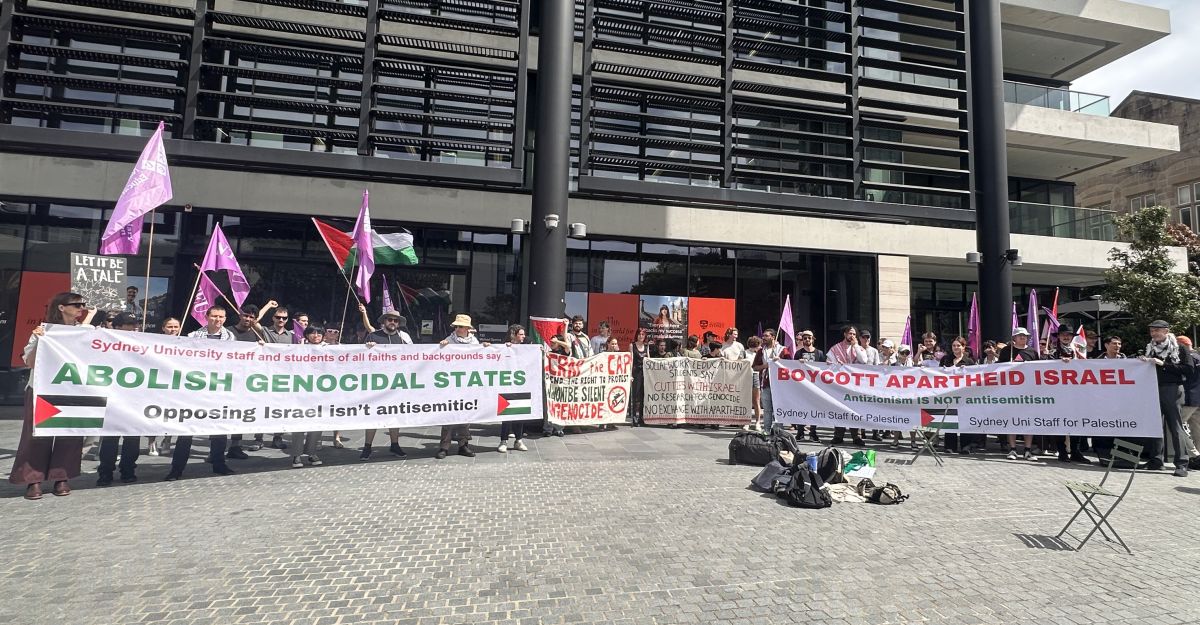I was one of the politically active students at the Orthodox Jewish school I attended from prep to Year 12. Many of the students who were vocal about politics tended to be centrist or right-wing, claiming this was because centre-right governments were better, and safer, for Jews. I saw myself differently. I went to protests about human rights and animal rights and I wrote letters to the editors of newspapers about LGBT+ issues. In my mind, these were left-wing causes. I felt passionately about the treatment of First Nations peoples and other peoples facing occupation and oppression, except for one: Palestinians. In that way, I was just like the centrist and right-leaning members of my community.
From a young age, I was taught about the Jewish exodus while the 1948 Palestinian exodus and Nakba was erased. We weren’t taught about any trace of solidarity between Jews and Arabs. My school taught us about Jewish laws, commandments and values alongside what was described as a love for the State of Israel. This love was decontextualised from historic facts and evidence, requiring individuals to go on their own pathways of learning, much like non-Indigenous people in Australia having to relearn history after a predominantly racist schooling experience and childhood. Not many chose to take this journey, unfortunately, including those who considered themselves progressive.
Jewish people who consider themselves progressive or ‘liberal’ often have left-wing views on Australian and international politics with the exception of Israel/Palestine. This is also common among non-Jewish progressives. I just didn’t have a name for it. I finally found it in my thirties, in Angela Davis’ 2016 book, Freedom is a Constant Struggle: Ferguson, Palestine and the Foundations of a Movement, where she quotes Rebecca Vilkomerson’s description of people in the US who are ‘progressive except for Palestine’.
The concept resonated strongly with what I was seeing amongst Jewish and non-Jewish progressives. I reached out to Dr Alana Lentin, Associate Professor of Cultural & Social Analysis at the University of Western Sydney, for her insights. She told me:
Many people who consider themselves progressive or left-leaning, but who have a poor understanding of the entangled histories of race, colonialism and antisemitism, believe that it could be construed as antisemitic to criticise Israel. This in itself is an antisemitic mindset because it forces an identification of all Jews with Israel thus denying our right to exist as Jews everywhere in the world and not to be associated with the actions of a racist colonial state.
Too often, the conflation of criticism of Israel with antisemitism prevents important discussions and debates from taking place. The Australia Palestine Advocacy Network (APAN) and the Australian Jewish Democratic Society (AJDS) recently worked together and released a joint statement that challenges the International Holocaust Remembrance Alliance’s (IHRA) definition of antisemitism, which includes the following: ‘Denying the Jewish people their right to self-determination, e.g., by claiming that the existence of a State of Israel is a racist endeavor’.
At the event that launched the AJDS-APAN statement, the Jewish and Palestinian speakers described how this definition is ‘weaponised’ to supress criticism of Israel. This echoes the phrasing of the American attorney, Kenneth Stern, who initially drafted the IHRA definition and now has concerns about right-wing Jewish groups deciding to ‘weaponize it’, attack academic freedom and harm not only pro-Palestinian advocates but Jewish students and faculty. Jews who speak out against Israel are often labelled self-hating Jews, ostracised within the Jewish community and are sometimes called Kapos, a particularly vile term.
I spoke to Dr Jordy Silverstein, a historian based in Melbourne, who told me there are many reasons as to why Jews exclude Israel/Palestine from their activism.
So many of us are raised in Zionist households and and communities and it’s hard to break out of that. It takes a lot of work, a lot of challenging oneself, a lot of thinking creatively and listening to people who you’ve become accustomed not to listen to (i.e. people you’ve been taught not to listen to). [There’s also] the long aftermath of Holocaust trauma … and there’s the fact that the nation-state is sold to so many people (not just Jews!) as the only possible source of self-determination. It’s devastating to me that the history of Jewish thinking about self-determination, the history of the ways that Jews have grappled with how to live in the world and live amongst others, and grow and flourish amongst others, has been covered over. The nation-state as the ultimate end-point is held up as the only option: the multiplicity of options for what else there could be are foreclosed. Everyone should read Daniel Boyarin, Jonathan Boyarin, Ella Shohat, Melanie Kaye/Kantrowitz and Loolwa Khazoom and all the others who write on this, and learn about Jewish Diasporism. There’s so much beauty in there! But not enough people are given the opportunity to find and learn from these texts.
I asked Dr Silverstein what she thinks of the particular phenomenon of progressivism that excludes the Palestinian cause. ‘Progressive Except for Palestine is a furphy, it’s a cop-out, it’s a false pretence,’ she replied. ‘It’s a way of pretending that one has ‘good politics’ without actually having the politics or the analysis. We need to dismantle it as a category.’
The divide within Jewish communities globally is more evident than ever, particularly as organisations scramble to release statements about Black Lives Matter. Some centrist and right-wing Jewish communities have identified Black Lives Matter as an ‘antisemitic organisation’ and accused protestors of ‘weaponized intersectionality’ and ‘incitement’ due to their comparisons between the Black Lives Matter Movement and the plight of Palestinians. Some progressive Jewish organisations have released statements in support of Black Lives Matter that do not mention Israel’s treatment of Palestinians, despite the recent murders of Iyad Halak and Ahmed Mustafa Erekat by Israeli Border Police.
There have been Jewish organisations and individuals that spoke out against annexation of the West Bank, against the occupation and in support of divesting from police. However, these global organisations are disparate. As a result, individuals may not find and connect with like-minded communities, which weakens efforts to build a united Jewish response alongside Palestinian solidarity movements.
After the AJDS-APAN statement was released, the Australian Jewish News (AJN) responded with an article and headline that referred to it as a ‘gross misrepresentation’ of the IHRA definition. The AJN claims to conduct its journalism based on the Australian Press Council’s guidelines, which include fairness and balance, but there does not seem to be room for criticism of Israel in its pages apart from the occasional letter to the editor. One of the speakers at the AJDS-APAN event, Vivienne Porzsolt – deputy convener of BDS Australia and spokesperson for Jews Against the Occupation – said that some Jewish people ‘instinctively experience attacks on Israel as a direct attack on them as Jews.’
The fear of antisemitism may stem from trauma and an increase in antisemitic attacks, ensuring that Jewish people remain attached to Zionism as ‘self-determination’ and continue their ongoing support of the State of Israel. However, as Porzsolt explained, ‘there are politically and morally acceptable ways to claim our place as a people without trampling on the rights of another people who had no role in our historic oppression.’ Progressive movements could do more to call out antisemitism in left-wing spaces, acknowledge fears, increase trauma sensitivity, and promote Palestinian rights through the lens of Jewish values.
At the AJDS-APAN event, Nasser Mashni – vice president of APAN and son of a Palestinian refugee – said ‘we believe in the liberation of everyone. We understand the need to oppose all forms of discrimination including antisemitism. It’s a moral imperative for us to stand against it with our Jewish friends and for our solidarity not to waver.’
When I listened to the speakers, I thought back to my schooling. I was taught, with my peers, that Palestinian land was our land. That ‘Never Again’ refers to the Holocaust, not to the treatment of First Nations and Indigenous peoples by the British, Dutch, Spanish, Portuguese, French and other colonisers, and certainly not to the treatment of Palestinians by the Israelis.
It’s not enough for progressives to oppose Israel’s actions silently anymore, particularly with the potential annexation of the West Bank, which would give Israel sovereignty over illegal settlements, the ‘friendship’ between Israeli Prime Minister Benjamin Netanyahu and US President Donald Trump, and the bias of Western media.
Porzsolt’s words will continue to echo with me. ‘Silence is consent,’ she said, ‘and we must use our undoubted influence in Israel to push for a peace based on justice, human rights and mutual acceptance and respect.’ As Dr Silverstein reminded me, ‘there’s a large Jewish community in Melbourne, across Australia, and around the world that is keen to learn and grow and change and work with others for justice in Palestine. I wish people could see the beauty in these forms of Jewishness, in these forms of working alongside Palestinians, and not worry so much about what their family/friends think of them.’
There’s no excuse or reasonable justification not to add our voices to the cause. Let’s dismantle the notion that we can be progressive except for Palestine once and for all. It’s not possible to be progressive without fighting for everyone.
Image: the Qalandiya checkpoint, Flickr






